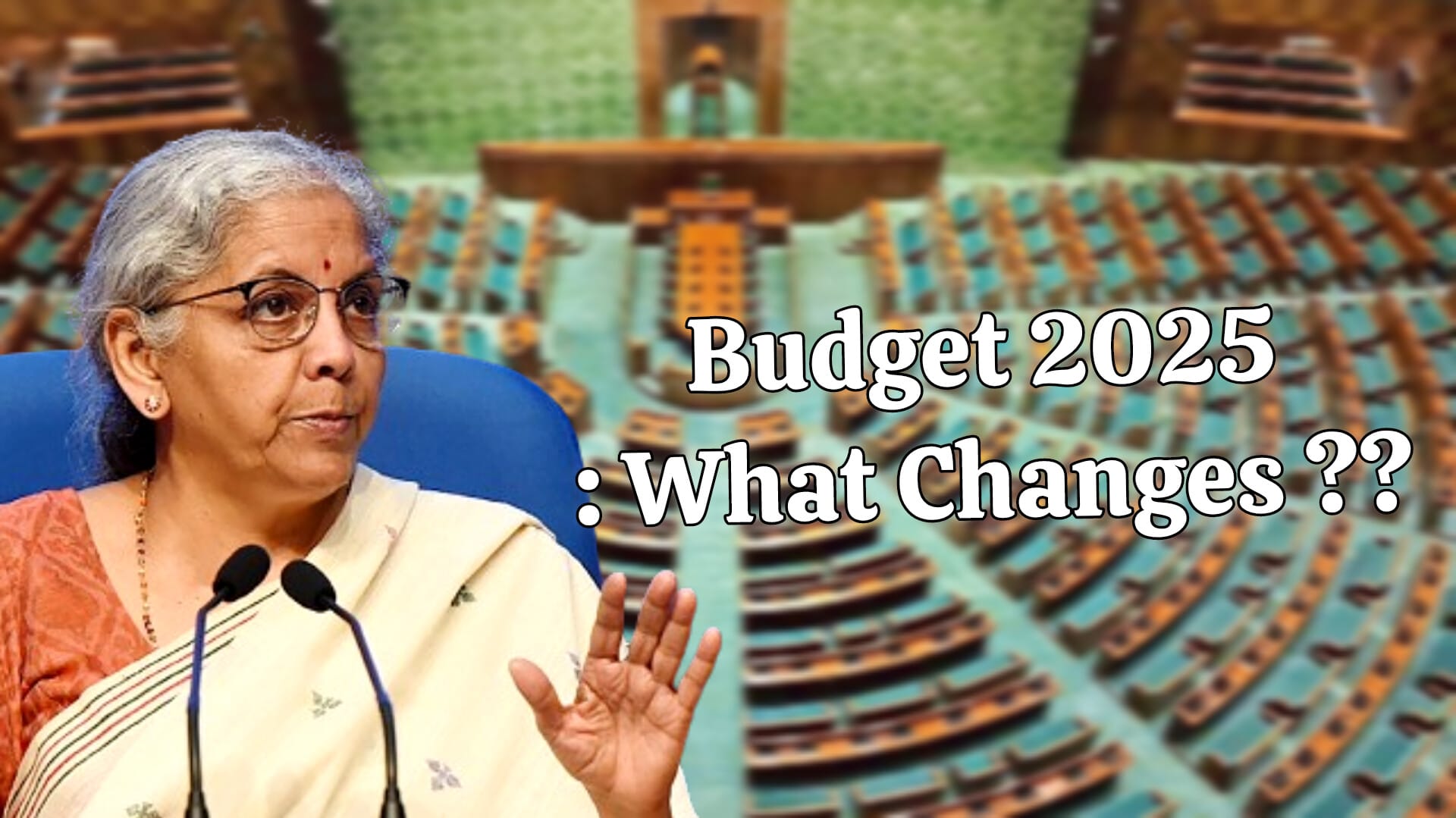Union Budget 2025 – 26 – Key Highlights:

India Union Budget 2025 vs 2024: Key Differences, Stock Market Impact, and What You Need to Know
Indian budget 2025 key points
1. Economy & Fiscal Management
✔️ GDP Growth: Projected at 6.3% – 6.8%.
✔️ Fiscal Deficit Target: 4.5% of GDP by FY 26.
✔️ Disinvestment & PSU Reforms: $1.5 billion allocated for revitalizing state-owned enterprises.
2. Taxation & Middle-Class Relief
✔️ Income Tax: Expected changes in tax slabs (details awaited).
✔️ GST Simplification: Measures to ease tax compliance for businesses.
✔️ New Digital Taxation: Regulations for online businesses & cryptocurrency.
3. Infrastructure & Capital Expenditure
✔️ Record ₹11.1 Lakh crore for roads, railways, and ports.
✔️ ₹1.5 trillion interest-free loans to states for infrastructure.
✔️ Expansion of urban metro rail projects.
4. Agriculture & Rural Development
✔️ Kisan Credit Card (KCC) limit raised from ₹3 lakh to ₹5 lakh.
✔️ Pulses & Cotton Missions to reduce imports and boost self-sufficiency.
✔️ Irrigation Projects to support water-scarce regions.
5. Education & Skill Development
✔️ Expansion of 5 IITs, starting with IIT Patna.
✔️ PM Kaushal Vikas Yojana (PMKVY) boost for AI, robotics, and tech skills.
✔️ More scholarships for medical, engineering, and science students.
6. Healthcare & Pharma
✔️ More AIIMS hospitals and expansion of existing medical colleges.
✔️ Free essential medicines for rural areas under Ayushman Bharat.
✔️ ₹50,000 crore allocation for medical research & drug development.
7. Manufacturing & Industry
✔️ National Manufacturing Mission to promote “Make in India”.
✔️ Critical Minerals Development Policy for EV batteries & semiconductors.
✔️ 10-15% duty hike on telecom equipment imports to boost local production.
8. Digital & Fin-Tech Reforms
✔️ Revamped KYC process for financial transactions.
✔️ 100% FDI in insurance (earlier 74%).
✔️ Digital Payments Expansion to increase UPI accessibility globally.
9. Tourism & Connectivity
✔️ Visa-free entry for selected countries to boost tourism.
✔️ Regional air connectivity expansion under UDAN scheme.
✔️ ₹1 lakh crore allocation for heritage tourism.
10. Export & Trade
✔️ Export Promotion Mission to enhance global trade competitiveness.
✔️ Support for MSMEs to enter international markets.
✔️ New free trade agreements (FTAs) with key nations in progress.
This budget focuses on economic growth, digital transformation, infrastructure, and tax reforms while supporting agriculture, healthcare, and education.
India Union Budget 2025 vs 2024: Stock Market Impact, and What You Need to Know
The Union Budget 2025-26, presented on February 1, 2025, introduced significant changes to India’s tax structure to enhance the spending power of the middle class and stimulate economic growth.
Personal Income Tax Rates:
The budget has revised the personal income tax slabs under the new tax regime as follows:
- Up to ₹3,00,000: Nil
- ₹3,00,001 to ₹7,00,000: 5%
- ₹7,00,001 to ₹10,00,000: 10%
- ₹10,00,001 to ₹12,00,000: 15%
- ₹12,00,001 to ₹15,00,000: 20%
- Above ₹15,00,000: 30%
Notably, the nil tax slab has been increased to ₹1.2 million, providing substantial relief to taxpayers.
| Income Range | Tax Rate |
|---|---|
| Up to ₹3,00,000 | Nil |
| ₹3,00,001 to ₹7,00,000 | 5% |
| ₹7,00,001 to ₹10,00,000 | 10% |
| ₹10,00,001 to ₹12,00,000 | 15% |
| ₹12,00,001 to ₹15,00,000 | 20% |
| Above ₹15,00,000 | 30% |
Corporate Tax Rates:
The corporate tax rates remain consistent with previous structures:
- Existing Domestic Companies: A base rate of 22%, with an effective tax rate of approximately 25.17% after including surcharge and cess.
- New Manufacturing Companies: Incorporated after October 1, 2019, and commencing production before March 31, 2024, benefit from a reduced base rate of 15%, leading to an effective tax rate of about 17.16%.
These measures aim to boost disposable incomes, encourage consumer spending, and foster economic growth.
Union Budget 2025-26: Key Announcements for Startups
The Indian government has introduced several measures in Budget 2025-26 to support startups and entrepreneurship. Here are the major highlights:
1. Tax & Financial Incentives
✅ Tax Holiday Extension: Startups incorporated until March 31, 2026, can now avail tax exemptions under Section 80-IAC.
✅ ESOP Taxation Relaxation: Employee stock options (ESOPs) taxation is now deferred until exit or sale, reducing financial burden on employees.
✅ Reduced Compliance Burden: Simplified tax filing and compliance rules for startups.
2. Funding & Investment Support
✅ Startup India Seed Fund: Enhanced funding for early-stage startups, particularly in AI, deep tech, and AgriTech.
✅ Fund of Funds for Startups (FFS): ₹1,000 crore additional allocation to provide venture capital support.
✅ New Angel Tax Reforms: Angel investors to get tax benefits, encouraging more investments in Indian startups.
3. Digital & AI Innovation
✅ ₹5,000 crore AI Fund under IndiaAI mission to support startups working in artificial intelligence, data analytics, and automation.
✅ Expansion of Digital Public Infrastructure (DPI) to help fintech, healthtech, and edtech startups integrate with government platforms.
4. MSME & Startup Collaboration
✅ Credit Guarantee Scheme for startups to access collateral-free loans with reduced interest rates.
✅ Ease of Doing Business: Faster business registration & patent approvals for startups.
5. Industry-Specific Boost
✅ EV & Green Tech Startups: Special incentives for electric vehicle, renewable energy, and climate tech startups.
✅ Agritech & Rural Startups: ₹2,500 crore allocated to promote agritech innovation and rural entrepreneurship.
6. Startup Hubs & Incubators
✅ New Startup Hubs in Tier 2 & Tier 3 cities to support grassroots innovation.
✅ More funding for state-level incubators and accelerators.
7. Global Expansion & Export Incentives
✅ Startup Internationalization Program to help Indian startups expand globally.
✅ Tax benefits on exports of software, AI solutions, and digital services.
This budget reinforces the government’s commitment to the startup ecosystem, making India a global hub for innovation & entrepreneurship!
India Union Budget 2025 vs 2024: Stock Market Impact, and What You Need to Know
The Capital Gains Tax changes in the Union Budget 2025-26:
1. Long-Term Capital Gains (LTCG)
- Equity: Holding period reduced to 2 years, taxed at 10% above ₹1 lakh.
- Real Estate: Holding period reduced to 1 year, taxed at 20% with indexation.
- Debt Mutual Funds: Holding period reduced to 2 years, taxed at 20% with indexation.
2. Short-Term Capital Gains (STCG)
- Equity: Taxed at 15% if held for less than 2 years.
3. Other Changes
- Dividend Tax: 10% tax on dividends exceeding ₹10 lakh per year.
These changes simplify tax rules and encourage long-term investments.
Follow us :


